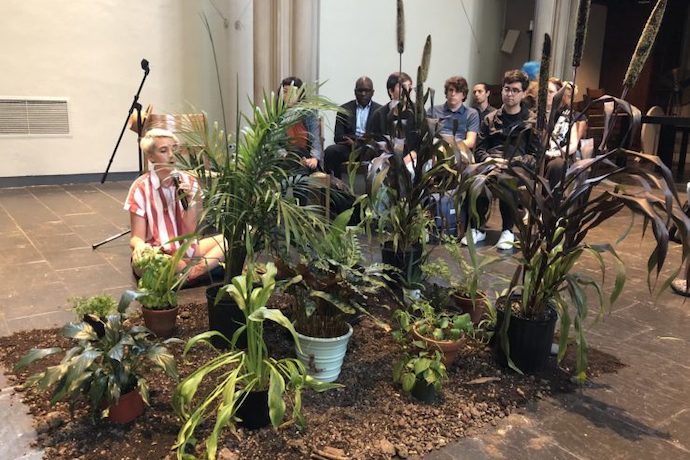This week Union Theological Seminary in New York created a social media stir. The tweet began: “Today in chapel, we confessed to plants.”
Today in chapel, we confessed to plants. Together, we held our grief, joy, regret, hope, guilt and sorrow in prayer; offering them to the beings who sustain us but whose gift we too often fail to honor.
What do you confess to the plants in your life? pic.twitter.com/tEs3Vm8oU4
— Union Seminary (@UnionSeminary) September 17, 2019
Surely the seminary administrators anticipated a backlash. The responses ranged from snarky dismissal to substantive theological critique. Some respondents accused the seminary of promoting idolatry on the premise that confessing to plants inherently places plants in the place of God. The controversy itself merits reflection. So does the question of liturgical innovation.
Honestly, I have my own reservations about confessing to plants. It is not true that Christians should confess to God alone. We confess to one another all the time, including in classic liturgies. Litanies for transition in ministry almost always include mutual confession to one another between a departing minister and the community they have served. Confession to plants is not idolatrous in and of itself.
Surely we have some confessing to do about plants. Our conventional theologies overemphasize the relationships among humans and between humans and God, so that we scarcely take account of our moral obligations to God’s creatures. Our food supply inflicts enormous and unnecessary cruelty to animals. We would not behave this way if we took moral account of animal suffering. Our theologies and liturgies have offered little to address this evil. Perhaps liturgies might include embodied acts of love toward animals as part of a process of confession and reconciliation.
Moreover, our indifference toward plants and animals is reaping a whirlwind of harm. We are not experiencing mere climate change, we are living through a climate emergency. The science is alarming. We’ve learned the emergency began a good while ago, but most of us did not appreciate its gravity. The emergency is accelerating faster than the scientific consensus predicted. We once thought of it as an inconvenience for humankind. Now we recognize the climate emergency as a direct threat to our species’ survival—and relatively soon. Our cruelty to plants and animals is turning back upon ourselves.
My reservation about confession to plants revolves around the mysteries of plant biology. The best I can tell, plants are not sentient. Plants do not actually suffer, nor do they enjoy or appreciate kindness. They can wither, and they can flourish. Therefore I cannot make sense of what it means to offer confession to plants. Confession requires sentience on both sides of the process. I commend the people who decided that the harm we have done to plants merits liturgical acknowledgment. It makes more sense to confess about our behavior toward plant life, not to confess to the plants themselves.
Beyond the propriety of confessing to plants, we also face the question of liturgical innovation. Here is one rare space in which I find myself a cranky conservative. (Get off my lawn!) I believe we should exercise great care in adapting our liturgies to address contemporary and emerging issues.
Liturgists must take account of the coercive nature of worship. People typically arrive at worship without knowing what they are expected to pray and sing. They also expect to participate. If liturgy asks people to pray or sing things that raise reservations, they find themselves in a quandary. It feels wrong to participate, and it feels equally problematic to refrain. Although I very much appreciate innovative worship, I have experienced this situation too many times.
To be sure, I feel uncomfortable with worship every week. I’m asked to affirm things I desire to believe when the truth is that I carry doubts and reservations. May I please have an asterisk? I’m asked to voice devotion at a depth of aspiration rather than lived reality. This sort of discomfort is a good and necessary thing.
I further need worship to challenge me. I believe in democracy, but democracy is not the gospel. My assumptions about my privilege, my relationships, and my property will sit uneasily on my shoulders when confronted by the gospel. I am wrong about more things than I know, and liturgy should bring these wrongs before me in the presence of fellow believers and of God.
It appears the Union worship service was part of a course on activism and liturgy rather than a regular chapel service. Perhaps worshipers were informed of the liturgy in advance. Were I asked to confess to plants without knowing it in advance, I would have been justified in feeling imposed upon. I’d also be aware others likely feel greater reservations than I.
The classic liturgies have limitations, but they generally serve worshipers well. Often I worship in congregations that use contemporary confessions of sin, and they commonly seem so petty. As Christians, we ask God to forgive us for our bad attitudes, and we should. But the classic liturgies confront us with a bigger, albeit generic truth: we have sinned against God and against our neighbors. We have not loved as we should. We have sinned in thought, word, and deed. I’m not Lutheran, but I’m happy to confess: we are in bondage to sin, and we cannot save ourselves.
How true that is of our relationship to plants and animals. Maybe liturgical planners could encourage us to bear those realities in mind as we Christians confess our sins against God and our neighbors.


